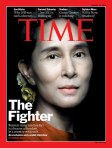A prisoner of conscience is one too many
Barack Obama, Aung San Suu Kyi
In 1989 Aung San Suu Kyi, after having worked at the United Nations for 3 years, got married and had 2 children, was put under house arrest in Burma, where she would have remained for 15 years. That because she fought the military regime in her native country. Aung San Suu Kyi was given the choice to leave the country, but decided to stay whatsoever. By doing so she lost any opportunity to see her children growing or her husband who died in 1995 from cancer.
Aung San Suu Kyi admitted that she was in a much easier position compared to other political prisoners “because from the very beginning I was under the protection of my father’s name”.
Indeed, her father negotiate the independence of Burma in 1947.
Nevertheless the detention was a hard one for her. she felt cut out from the world. Until she received the Nobel price which restored in her a sense of reality and brought her back to life by recognizing the plight of Burma people outside the national boundaries.
Aung San Suu Kyi adopted a non violent stance as a form of political protest stating the necessity to fight against any policy or practice that erodes human dignity and democracy.
She thinks that the rule of law must guarantee human rights. Only by safeguarding these two a government can create a free society where the people can realize its full potential.
Her relise from house arrest was followed by an amnesty for one tenth of political prisoners in Burma and the legalization of trade unionism.
Burma and the legalization of trade unionism.
Aung San Suu Kyi joined the National League for Democracy which she helped found back in 1988, and finally entered parliament with the aim to eliminate sectarian violence between buddisth and the muslim minority of Rohingya in the North of Burma beside reforming the Constitution and making of Burma a democratic country.